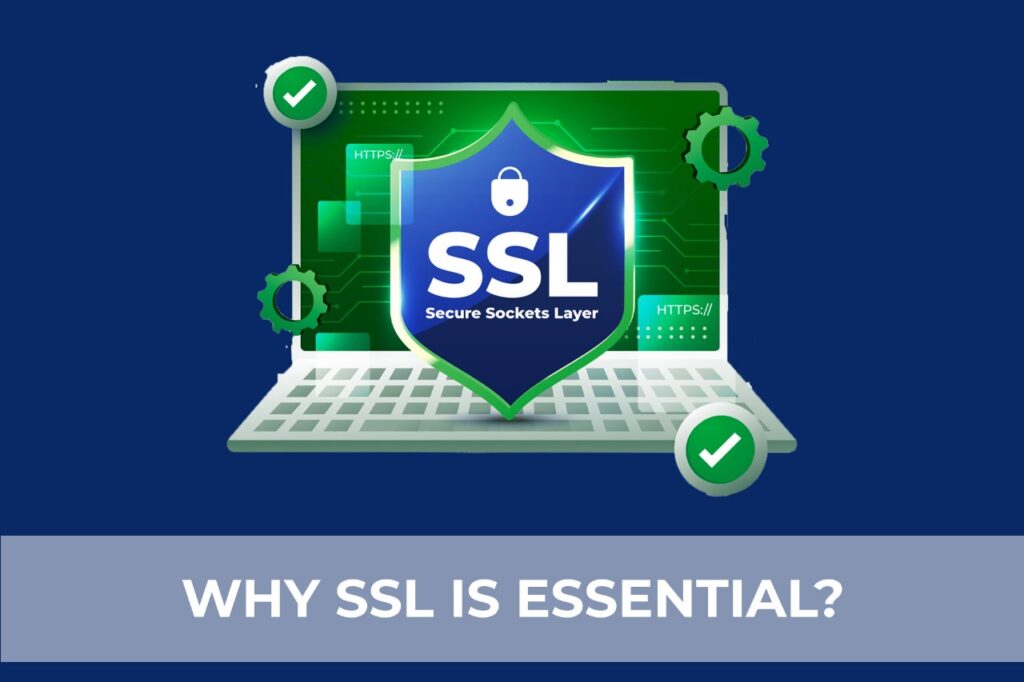The Imperative of SSL
In the contemporary digital era, where the complexity of cyber threats and online security breaches is advancing at an accelerated pace, upholding the sanctity and incorruptibility of data transmitted over the internet is of paramount importance. One of the most efficacious means to accomplish this is through the utilization of Secure Sockets Layer (SSL) technology. In the forthcoming exposition, we shall immerse ourselves in the significance of SSL and its indispensable role for websites and online enterprises.
Prelude SSL, abbreviated for Secure Sockets Layer, represents a prevailing security protocol that forges a secure and cryptic nexus between a web server and the web client’s browser. This technologically advanced apparatus guarantees the confidentiality and sanctity of the data interchanged between these two pivotal terminals, making it invulnerable to malevolent interception.
Deciphering SSL At its fundamental core, SSL employs encryption to metamorphose data into an inscrutable code during its transit. This encryption process relies upon intricate algorithms, the keys to decrypt which are the exclusive domain of authorized entities. The outcome is the establishment of a secure and secluded communication conduit.
The Significance of Data Safeguarding In the digital realm, data security assumes the pinnacle of significance. Whether it encompasses personal particulars, financial data, or delicate corporate documentation, the imperative of shielding such information from prying eyes and cyber felons is a primordial concern.
SSL and the Credibility of Websites When website visitors observe the presence of SSL protection, it imbues them with a sense of trust in the authenticity of the site. SSL serves as a conspicuous indicator of a website’s integrity, rendering it indispensable for the cultivation of faith among your audience.
Elevating Search Engine Rankings Prominent search engines, including the likes of Google, accord preference to secure websites. Websites equipped with SSL certificates typically ascend to loftier echelons in search outcomes. Thus, SSL is not merely about security but also constitutes a pivotal facet of search engine optimization.
Elucidating SSL Certificates SSL certificates are the digital keys that facilitate secure connections. They are dispensed by accredited Certificate Authorities (CAs) following a rigorous vetting process. These certificates encapsulate data concerning the certificate holder.
Variant Forms of SSL Certificates A spectrum of SSL certificates is available, encompassing Domain Validated (DV), Organization Validated (OV), and Extended Validation (EV) certificates. The choice among these options is contingent on the extent of validation and security mandated.
Discerning the Apt SSL Certificate Selecting the apropos SSL certificate is of paramount importance. The selection must harmonize with the character of your website or business. In the domain of e-commerce, Extended Validation (EV) certificates often come highly recommended due to their heightened level of validation.
The Installation Process for SSL The installation of an SSL certificate on your website is a streamlined procedure. It entails the generation of a Certificate Signing Request (CSR), the acquisition of a certificate, and subsequent installation and configuration on your web server.
Renewal and Upkeep of SSL SSL certificates bear an expiration date, necessitating regular renewal. The vigilance in maintaining your SSL certificate ensures a continuous shield of security and the enduring trust of your website’s visitors.
SSL and Its Relevance to E-commerce E-commerce platforms, in particular, derive substantial benefits from the adoption of SSL. It provides a secure milieu for online transactions, thus safeguarding sensitive customer data such as credit card particulars.
The Interplay of SSL and SEO The role of SSL in the realm of SEO is significant. Google affords recognition to SSL as a determinant in website rankings, and secure websites are predisposed to enjoy heightened visibility on search engines.
Best Practices in Implementing SSL The correct implementation of SSL is tantamount to having it. This necessitates ensuring the secure encapsulation of all web pages, including subdomains, and employing 301 redirects to obviate issues pertaining to duplicated content.
SSL Compatibility Across Web Browsers SSL operates harmoniously across a plethora of web browsers, guaranteeing that your website remains a haven of security for all visitors, irrespective of their chosen browsing platform.
In Summation In summary, SSL is not merely a technical exigency but also an integral component for fostering trust among your website’s visitors. It amplifies security, augments SEO rankings, and contributes to the cultivation of a sanguine online reputation. As the specter of online threats evolves, SSL continues to remain an indispensable instrument for the preservation of your digital presence.
Five Unusual Queries
- What is the pivotal role of SSL in the realm of online security?
SSL serves as the linchpin in the encryption of data transferred between a web server and a client’s browser, thereby heightening the security quotient of online interactions. 2. How can one ascertain the judicious choice of an SSL certificate suitable for their website?
The selection of an SSL certificate is contingent upon the inherent nature of one’s website. Deliberations must encompass the level of validation and security requisite for the specific context. 3. Is SSL an obligatory facet for e-commerce websites?
E-commerce platforms stand to derive substantial advantages from the adoption of SSL, as it erects a fortified bastion around online transactions and confers protection upon sensitive customer data. 4. What is the correlation between SSL and search engine rankings?
Search engines accord priority to websites that embrace secure protocols, and SSL can wield a tangible influence in augmenting one’s standing in search engine results. 5. What are the optimal strategies when embarking on the implementation of SSL on a website?
The efficacious implementation of SSL necessitates comprehensive encryption of all web pages, inclusive of subdomains, and judicious employment of 301 redirects to mitigate the quagmire of duplicated content.
